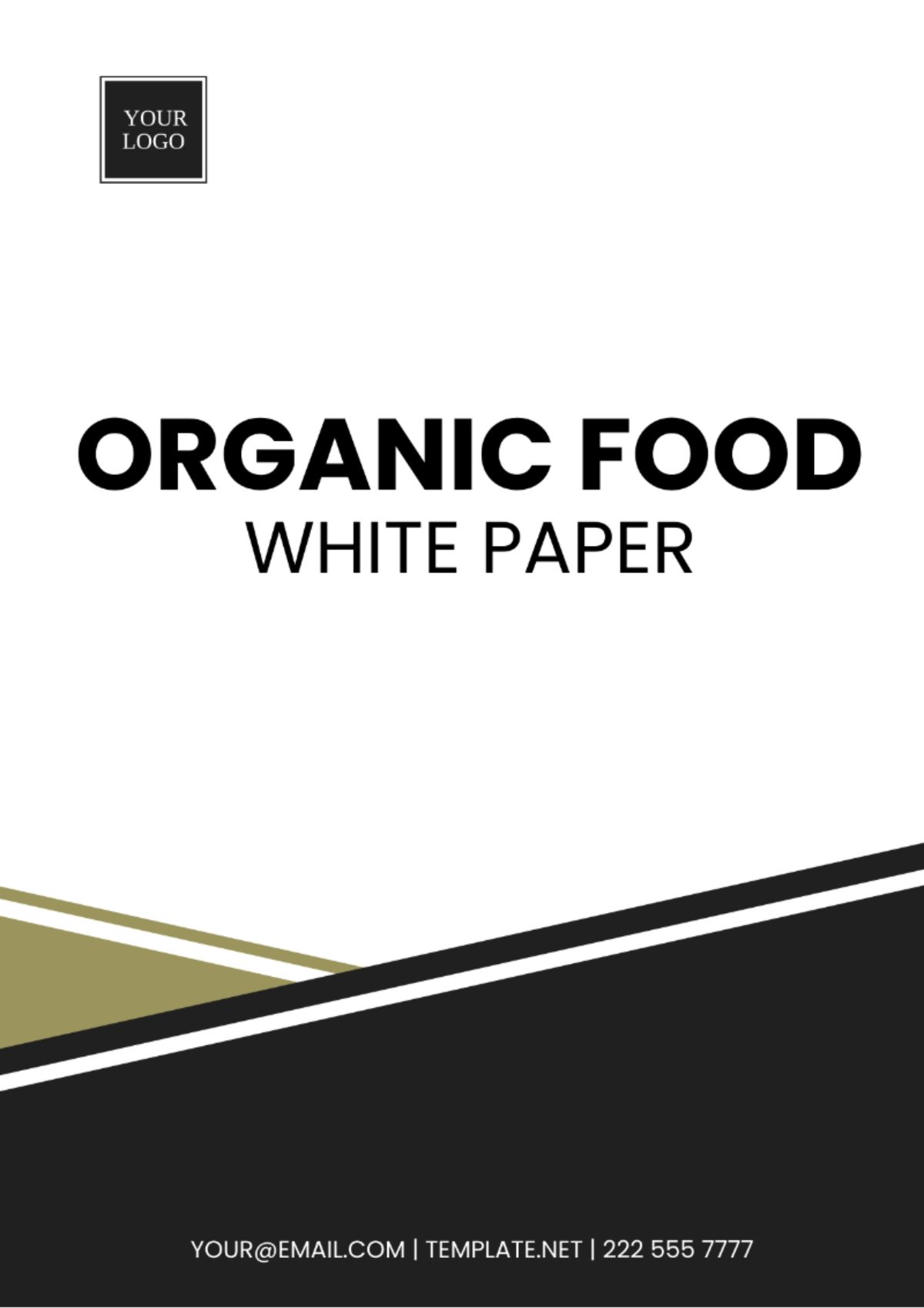Free Organic Food White Paper

WHITE PAPER
_____________________________________________________________________________________
_____________________________________________________________________________________
Organic Food Insights: Trends, Challenges, and Opportunities
Prepared for: [Your Company Name]
Prepared by: [Your Name], [Your Department]
Date: [Date]
_____________________________________________________________________________________

I. Executive Summary
The [Your Company Name] Organic Food White Paper provides a comprehensive analysis of the organic food industry, highlighting its significance, benefits, challenges, and future trends. This document aims to equip stakeholders with valuable insights to navigate the organic food landscape effectively.
II. Introduction
A. Overview
The introduction section provides an overview of organic food, emphasizing its importance in promoting health, sustainability, and environmental stewardship.
III. Background
A. History of Organic Farming
This section delves into the origins and evolution of organic farming practices, tracing their development from traditional agricultural methods to modern organic standards.
IV. Benefits of Organic Food

A. Health Benefits
Organic food is free from synthetic pesticides and fertilizers, reducing exposure to harmful chemicals.
Organic farming practices promote soil health, resulting in nutrient-rich produce with higher levels of vitamins and antioxidants.
B. Environmental Benefits
Organic farming reduces soil erosion, water pollution, and greenhouse gas emissions.
Organic practices promote biodiversity and support ecosystem resilience.
V. Challenges and Issues
A. Production Costs
Organic farming often entails higher production costs compared to conventional methods.
Limited access to affordable organic options may hinder consumer adoption.
B. Regulatory Compliance
Compliance with organic certification standards can be complex and costly for farmers and producers.
Regulatory inconsistencies and loopholes pose challenges to maintaining organic integrity.
VI. Consumer Trends

A. Increasing Awareness
Consumer awareness of the health and environmental benefits of organic food is on the rise.
Millennials and Gen Z consumers are driving demand for organic products, seeking transparency and sustainability in their food choices.
VII. Market Analysis
_____________________________________________________________________________________
Title: "Trends in Organic Food Market Growth"
_____________________________________________________________________________________
A. Market Size and Growth
The organic food market has experienced steady growth in recent years, fueled by increasing consumer demand.
Key market segments include organic fruits and vegetables, dairy products, meat, and packaged foods.
_____________________________________________________________________________________
Title: "Market Share of Key Players in the Organic Food Industry"
_____________________________________________________________________________________
B. Competitive Landscape
Large retailers and organic specialty stores dominate the organic food market, offering a wide range of organic products.
Direct-to-consumer sales and online platforms are emerging as significant distribution channels for organic food.
VIII. Certification and Regulations
A. Organic Certification Standards
Various certification bodies, such as USDA Organic and EU Organic, enforce organic standards and ensure product integrity.
Organic labeling requirements provide consumers with transparency and assurance of organic authenticity.
IX. Conclusion
The [Your Company Name] Organic Food White Paper underscores the importance of organic food in promoting health, sustainability, and environmental stewardship. By addressing challenges, embracing consumer trends, and fostering innovation, stakeholders can capitalize on the opportunities presented by the growing organic food market.
X. References
Dangour, A. D., Lock, K., Hayter, A., Aikenhead, A., Allen, E., & Uauy, R. (2010). Nutrition-related health effects of organic foods: a systematic review. the American Journal of Clinical Nutrition, 92(1), 203–210. https://doi.org/10.3945/ajcn.2010.29269
Worthington, V. E. (2001). Nutritional quality of organic versus conventional fruits, vegetables, and grains. the Journal of Alternative and Complementary Medicine/Journal of Alternative and Complementary Medicine, 7(2), 161–173. https://doi.org/10.1089/107555301750164244
_____________________________________________________________________________________
- 100% Customizable, free editor
- Access 1 Million+ Templates, photo’s & graphics
- Download or share as a template
- Click and replace photos, graphics, text, backgrounds
- Resize, crop, AI write & more
- Access advanced editor
Unlock the potential of organic food advocacy with the Organic Food White Paper Template from Template.net. This editable, customizable template provides a robust framework for exploring organic food benefits and challenges. Accessible in our AI tool, tailor it to your message effortlessly. Empower your cause with clear, compelling communication.





























